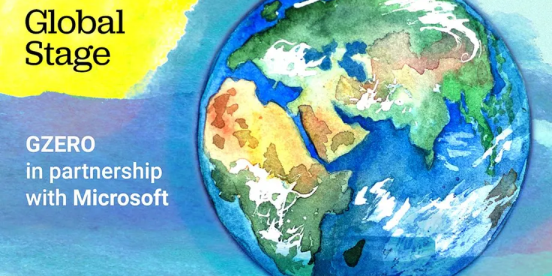We have updated our Privacy Policy and Terms of Use for Eurasia Group and its affiliates, including GZERO Media, to clarify the types of data we collect, how we collect it, how we use data and with whom we share data. By using our website you consent to our Terms and Conditions and Privacy Policy, including the transfer of your personal data to the United States from your country of residence, and our use of cookies described in our Cookie Policy.

Spare a thought for Liberal Canadian hockey fans, who have had a tough week.
They cried into their beer Monday night as the Florida Panthers, rather than the Edmonton Oilers, skated away with the Stanley Cup. Then they tasted ashes Wednesday morning when they awoke to the news that the Liberals had lost a normally safe Toronto seat in a by-election.
While the bruised and bearded Oilers are headed to the golf course, the Liberal team has to stay on the ice and keep getting smashed into the boards by opponents, the fearsome Conservatives, who have a huge lead.
Whenever a team keeps losing, as the Liberals do, it’s normal to fire the manager, as the Oilers did Thursday. That’s terrible news for Prime Minister Justin Trudeau, the player/coach singularly responsible for the upset in Toronto.
It is a bad enough blow that everyone in the rink is now wondering if dumping Trudeau can spare the Liberals the drubbing they expect from the Conservatives.
Toronto-St. Paul’s — the riding the Liberals lost on Monday — has been held by the Liberal party since 1993, when Brian Mulroney’s Progressive Conservatives were swept from office. In the decades since, even when Stephen Harper presided over a Conservative majority government, Toronto-St. Paul’s and similar downtown ridings were unassailable Liberal bastions. Now and then, the left-wing NDP would take a seat or two in the grittier heart of the city, and the Conservatives nipped at the suburban edges, but most of Canada’s biggest city was safe for Liberal MPs.
Tired of Trudeau
Tuesday’s loss is a sign that the Liberals are losing even the progressive, well-educated urban professionals whose support they can normally take for granted. A low-profile Conservative candidate managed to beat a hard-working and talented Liberal by 590 votes in a riding the Liberals won by almost 14,000 votes in 2021. That’s a 25-point swing to the Conservatives.
“It’s an effing debacle of proportions I cannot even describe to a non-organizer,” one veteran party worker texted me. “We don’t lose those ridings.”
If there was a similar result in a general election, the Liberals would lose all but a handful of their seats in Ontario, a wipeout that would land them in third or fourth place, worse even than their position when Trudeau became leader.
Trudeau was a once-in-a-generation phenomenon. With his good looks and a dynastic connection to voters, he carried the party back to power when it was headed to oblivion. But the magic is gone. Trudeaumania has turned to Trudeau hate.
Ever since Conservatives elected Pierre Poilievre as leader in 2022, Trudeau has trailed him distantly in the polls. It doesn’t matter what he does. Having misread the public mood on immigration, housing, and cost-of-living concerns, he undertook a comprehensive reboot with his budget this spring, rolling out carefully designed new policies over several weeks in an expertly orchestrated campaign – and it did not move the dial at all. Canadians are tired of him and want a change, as they made clear in Toronto-St. Paul’s on Monday. They will get that change. The only question is how.
Many contenders
If Trudeau hangs on as long as he can – to the fall of 2025 – voters will get the change by wiping out the Liberals and electing Poilievre’s Conservatives. If Trudeau leaves now, the Liberals can try to give voters change in the form of a new leader.
After the loss, cabinet ministers went out to say Trudeau has their support and should stay, but insiders are nervously awaiting backbenchers or former ministers to call for Trudeau’s head. “That’s the part he doesn’t control,” said one. “And those voices might come from inside the house or outside the house.”
Trudeau wouldn’t have to heed those calls, but they could make his position untenable.
“Some people say, ‘Well, it’s impossible to push out a prime minister who doesn't want to go,’” says a well-connected Liberal. “Well, it's also hard to govern if you don’t have your caucus behind you.”
If Trudeau does announce soon that he will go, the party could hold a leadership race to end this fall with a new prime minister. There is no obvious successor, but there are promising contenders who could hope to prove themselves in a race, including Anita Anand, Mark Carney, François-Philippe Champagne, Sean Fraser, Mélanie Joly, and Dominic LeBlanc.
Until the whistle blows and we see how they skate, we won’t if any of them can handle a puck. None of them might have what it takes, but it is clear that until Trudeau is gone, nobody is going to be able to take a critical look at Poilievre, the man who wants to replace him.
If Trudeau is the Liberal candidate in the next election, it will be a referendum on him. If it is someone else, it might turn on a different question, like Poilievre’s as-yet-unknown plans for the country.
Of course, there is a good chance that whatever the Liberals do, they will lose. A leadership race may be dominated by debates about Gaza, creating a divisive spectacle that helps convince voters that it’s time to turn the page and bring in the Conservatives.
Dumping Trudeau is like pulling the goalie in the last seconds of a hockey game when you are down 2-1, as the Oilers did Tuesday night. It didn’t help in the end, but it might have, and they were going to lose if they didn’t.
